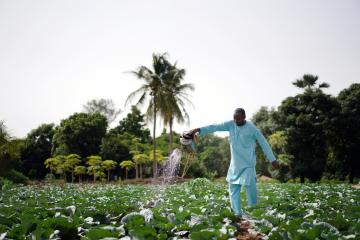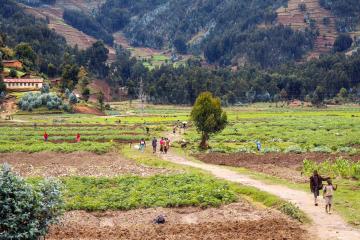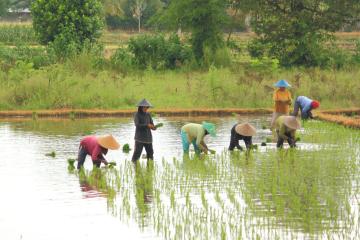
Celebrating the DAISI Regional Scholars Program—Two-years strong

This piece was originally published by the Center for Effective Global Action.
The Regional Scholars Program has taken center stage at the Digital Agricultural Innovations and Services Initiative (DAISI) nearly two years after its launch. The DAISI Regional Scholars Program is integral to DAISI, which is co-managed by the Center for Effective Global Action (CEGA) at the University of California, Berkeley, and the Abdul Latif Jameel Poverty Action Lab (J-PAL) at the Massachusetts Institute of Technology, and promotes research opportunities for scholars based in sub-Saharan Africa and South Asia.
In this blog, Abel Mkulama, Program Associate at CEGA, highlights the DAISI Regional Scholars Program’s successes since its launch in 2021.
Building bridges in research
Generating evidence that can positively impact policy decisions requires a deep understanding of the local context and relationships with policymakers. Though researchers from low- and middle-income countries (LMICs) often possess both, according to a UNESCO report, they only produce two percent of the world’s research output. This is mainly due to limited access to research funding and research tools. However, impact evaluation capacity in LMICs is now increasing, thanks in part to programs such as the CEGA’s Global Networks Program and the J-PAL Scholars Programs that provide direct research training, mentorship, and funding opportunities for researchers based in LMICs who are using innovative approaches for reducing poverty.
In 2021, CEGA and J-PAL launched the Digital Agricultural Innovations and Services Initiative (DAISI), which funds research to rigorously evaluate programs that increase the availability, quality, and reach of bundled digital agricultural solutions and services for small-scale agricultural producers in South Asia and sub-Saharan Africa. As part of DAISI’s activities, the DAISI Regional Scholars Program advances funding opportunities and fosters mentorship for researchers interested in impact evaluation methodologies who hold a PhD and are based at academic institutions in South Asia and sub-Saharan Africa.
Mentoring Scholars on the rise
DAISI’s success is closely tied to our partnerships, strong network of researchers, and collaborative culture. The DAISI Regional Scholars Program affirms that local researchers are uniquely positioned to leverage contextual knowledge of the regional policy landscape and stakeholders to identify and evaluate relevant topics that can translate into meaningful policy action for achieving their nation’s development goals.
The program includes mentorship activities, fostering collaboration by pairing a Scholar with a CEGA or J-PAL-affiliated researcher who is based in a leading university and has experience conducting randomized impact evaluations. The mentorship provides space to share knowledge, engage in meaningful discussions, and explore research ideas. Scholars also receive constructive feedback while gaining hands-on experience in impact evaluation methods. Additionally, DAISI intends to convene Scholars for targeted interaction, fostering connections with both CEGA and J-PAL staff. To date, we have organized one virtual convening and expect to host more gatherings in the future.
Embedded in the underlying framework of this program is an approach that invests in and nurtures talent through global academic collaboration. We believe that mentorship serves as a crucial lever for the next generation of researchers involved in the evidence-informed policy movement.
Project spotlights
One DAISI Scholar, Fréjus Thoto, explored the possible effects of a digital, bundled service on agricultural and farmer outcomes like access to inputs and credit in the Benin Republic. Reflecting on the impact of the DAISI mentorship, Thoto said,
"As someone who is new to impact evaluations, the mentorship aspect of the DAISI Regional Scholars Program has been beneficial. My mentor provided insightful guidance on impact evaluations and shared valuable knowledge for evaluating digital applications in the agricultural sector. DAISI isn't merely about submitting and closing projects; it's a collaborative, community-built effort where collective wisdom drives progress."
Another Regional Scholars project, Digital Climate Change Adaptation Services for Sustainable Agricultural Productivity in Nigeria, led by Toyin Olowogbon and Segun Fakayode, explored a digital advisory service bundled with weather-based index insurance for small-scale maize producers in Nigeria. Sharing their DAISI Regional Scholar experience, the team said,
“The mentorship program is the most valuable aspect of the DAISI Regional Scholars program; it helped us develop and refine our research concepts and methods. This mentorship approach is the fastest way for scholars to advance their research and career development goals.”
Impact evaluation resources
CEGA, J-PAL, and our partners offer various opportunities to drive inclusion in the social science and global development ecosystems. Click the links below to learn more about application and eligibility requirements.
- CEGA’s Fellowship Program invests directly in cultivating the talents of junior African researchers by providing residential (at UC Berkeley and Northwestern) and non-residential impact evaluation fellowships.
- J-PAL Scholars Programs provide funding, mentorship, and training opportunities to researchers from low- and middle-income countries. We currently have Scholars Programs in sub-Saharan Africa, South Asia, and the Middle East and North Africa.
Every month, the CEGA Global Networks Opportunities Newsletter publishes funding, events, and career opportunities for scholars from Africa and beyond. Sign up for CEGA’s Opportunities digest here (choose “Global Networks).
To check on the status of future DAISI Requests for Proposals, please visit our website.
Related Content

Using insurance and climate-smart technologies to help farmers cope with weather-based risk

J-PAL and UM6P launch new agriculture research lab to improve food security and support evidence-informed decision-making in sub-Saharan Africa

